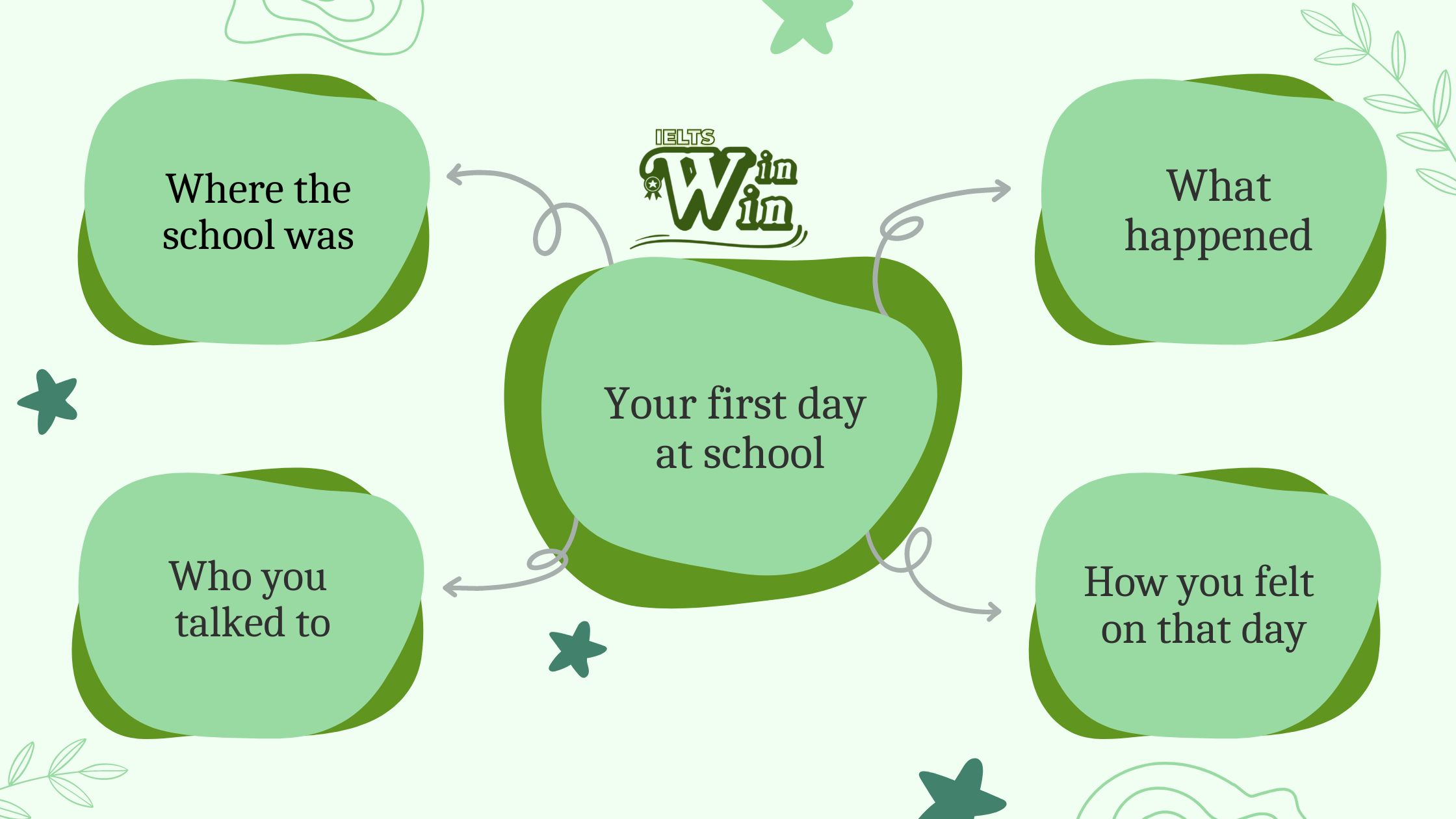✨Part 2: Describe your first day at school.
You should say:
- where the school was
- what happened
- who you talked to explain
- how you felt on that day.
My first step into middle school is a vivid memory, but unfortunately, it wasn't a pleasant one.
I had made many friends during my time in elementary school, but my mum insisted that I attend the middle school that was a stone's throw away from my house for easy drop off and pick up. I hated that idea because it meant that I would have to say goodbye to my old friends, and worse yet, start making new friends from scratch. The first day of school was a complete disaster for me. The new environment of middle school overwhelmed me, and I was intimidated by the unfamiliar faces. Despite being 11 years old, my mum still accompanied me on my first day, which was a little embarrassing. All of the students had to endure an hour-long welcome speech from the principal in the hot sun before we could go to our classrooms. Sadly, my experience in the classroom was even worse. Everyone already knew each other, and they quickly formed groups, leaving me alone. One girl even teased me about how childish I was for having my mum with me on the first day of school. I had no choice but to bear it until the teacher arrived and assigned seats. The only enjoyable part of that day was talking to my deskmate. We discovered that we had a lot in common and became friends from that moment onward.
I know every first day of school should be a memorable experience and yes, this terrible start to school actually stayed with me, but thankfully, my mum helped me deal with the bullies and encouraged me to keep my head up for the next two years until our family moved to a new house. Once again, I had to experience the "first day of school" in a completely new environment, but at least this time, I was more prepared for the challenge.
- Vivid: /ˈvɪvɪd/ (adj) - sống động, rõ ràng, sắc nét
- A stone's throw away: /ə stəʊnz θrəʊ əˈweɪ/ (n) - rất gần, chỉ cách đó một đoạn ngắn
- Drop off: /drɒp ɒf/ (v) - đưa ai đó đến nơi rồi rời khỏi, để ai đó xuống (xe, tàu, máy bay...)
- Pick up: /pɪk ʌp/ (v) - đón ai đó từ nơi nào đó, nhặt lên
- Start from scratch: /stɑːt frɒm skrætʃ/ (v) - bắt đầu từ đầu, từ con số 0
- Disaster: /dɪˈzɑːstər/ (n) - thảm họa, tai ương
- Overwhelmed: /ˌəʊvəˈwelm/ (adj) - quá tải, bị áp đảo
- Intimidated: /ɪnˈtɪmɪdeɪtɪd/ (adj) - bị đe dọa, sợ hãi
- Unfamiliar: /ʌnˈfæmɪliər/ (adj) - không quen thuộc, xa lạ
- Accompanied: /əˈkʌmpənid/ (v) - đi kèm, theo cùng
- Childish: /ˈtʃaɪldɪʃ/ (adj) - trẻ con, thiếu trưởng thành
- Memorable: /ˈmemərəbl/ (adj) - đáng nhớ, khó quên
PART 3
✨Do you think students should be taken to school by their parents or go by themselves?
It’s generally safer for students in kindergarten or primary school to be accompanied by an adult, like their parents, on their way to school. Plus, it can also help them calm down and get used to the new environment they're in. For older students, going to school on their own may be feasible if the school is nearby or reliable transportation options are available. However, if the school is located far from their home, parental accompaniment may still be necessary to ensure their safety.
- Feasible: /ˈfiːzəbl/ (adj) - có thể thực hiện được, khả thi
- Transportation: /ˌtrænspɔːˈteɪʃn/ (n) - phương tiện vận chuyển, giao thông
- Accompaniment: /əˈkʌmpənimənt/ (n) - bè phối, nhạc đệm
✨Should children rely on their parents or be independent?
I believe that parents have a responsibility to care for their children until they reach a certain age. It's natural for young children to need guidance and support from their parents as they navigate the world around them. However, it's also important to gradually teach them to take on their own responsibilities and make decisions for themselves. It's important for children to learn how to strike a balance between independence and having a supportive relationship with their parents. Of course, relying too much on their parents isn't ideal if they want to avoid being a "mama's boy" or "daddy's girl" forever.
- Responsibility: /rɪˌspɒnsəˈbɪləti/ (n) - trách nhiệm, nghĩa vụ
- Navigate: /ˈnævɪɡeɪt/ (v) - điều hướng, định hướng
- Gradually: /ˈɡrædʒuəli/ (adv) - từ từ, dần dần
- Strike: /straɪk/ (v) - đình công, đình chiến
- Independence: /ˌɪndɪˈpendəns/ (n) - độc lập, tự do
✨How can children become more independent?
There are many ways to encourage independence in children, as the methods parents use may vary. To foster decision-making skills, some parents let their kids make choices between simple things, such as picking out their own clothes. Additionally, to make children less reliant on their parents, they need to learn to take on responsibilities, such as making their bed or doing their own laundry. It's important to provide them with opportunities for independence, like walking to school alone, to expose them to new things and to face new challenges on their own.
- Foster: /ˈfɒstər/ (v) - nuôi dưỡng, bồi dưỡng
- Reliant: /rɪˈlaɪənt/ (adj) - phụ thuộc, tin tưởng vào
✨What is the effect if parents interfere with children’s life too much?
While it's important for parents to be involved in their children's lives, over-involvement can have adverse effects on their development and well-being. Overprotection and excessive control can lead to children feeling suffocated and unable to showcase their abilities, which can cause resentment in the short run and negatively affect their mental health in the long run. Intrusive parenting can also restrict opportunities for children to become independent, leading to poor decision-making and long-term reliance on their parents.
- Adverse: /ˈædvɜːs/ (adj) - có hại, bất lợi
- Overprotection: /ˌəʊvəprəˈtekʃn/ (n) - sự bảo vệ quá mức, quá chăm sóc
- Excessive: /ɪkˈsesɪv/ (adj) - quá mức, vượt quá giới hạn
- Resentment: /rɪˈzentmənt/ (n) - sự oán giận, sự phẫn nộ
- Intrusive: /ɪnˈtruːsɪv/ (adj) - xâm phạm, can thiệp
- Reliance: /rɪˈlaɪəns/ (n) - sự phụ thuộc, tin tưởng vào
✨How does changing school affect children?
Changing schools can be a significant transition for children and can have a major impact on their emotions. Switching schools can make children feel overwhelmed in an unfamiliar environment and may result in a sense of alienation as they are not yet accustomed to the new pace and culture of the school. Children may also face academic challenges due to changing schools. They may need time to adjust to the new timetable, curriculum, and teaching methods, which can lead to children missing out on certain subjects or falling behind in their studies.
- Transition: /trænˈzɪʃn/(n) - sự chuyển tiếp, sự chuyển đổi
- Alienation: /eɪliəˈneɪʃn/ (n) - sự xa lánh, bất đồng quan điểm
- Accustomed: /əˈkʌstəmd/ (adj) - quen thuộc, đã quen với
- Curriculum: /kəˈrɪkjʊləm/ (n) - chương trình giảng dạy, giáo trình.
Xem thêm các bài viết về Speaking Part 2 và 3 ở đây bạn nhé
Đừng ngần ngại để lại thông tin hoặc liên hệ với chúng mình qua địa chỉ sau đây để IELTS WinWin có thể hỗ trợ tốt nhất cho bạn nhé!
Địa chỉ: 118 Nguyễn Xuân Khoát, P. Tân Thành, Q. Tân Phú, TP. Hồ Chí Minh.
Fanpage: IELTS WinWin
Zalo: 0965 439 239 – 085 301 8788
Website: ieltswinwin.com



